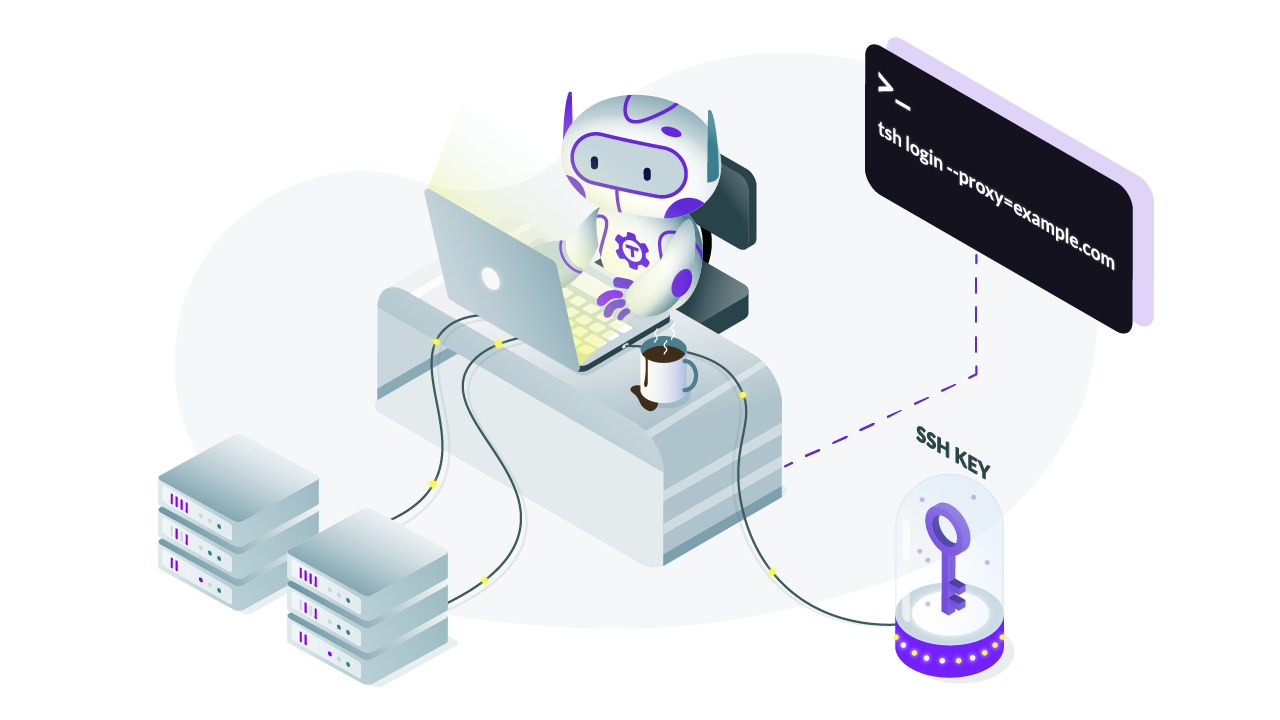Home - Teleport Blog - Running IT at a Hyper Growth Startup - Oct 13, 2021
Running IT at a Hyper Growth Startup

At Teleport we do IT a little differently — supporting a global remote company in hypergrowth is no easy feat and the playbook is different from traditional IT work. In this article, we want to share some of our IT philosophies that enable our employees to keep their agility despite working very asynchronously around the world.
- Tickets are the symptom not the cure
- Automation first
- Self-service over support
- Operate like a DevOps team
- Support career growth and internal mobility
Tickets are the symptom not the cure
IT teams often traditionally work as a responsive ticket-queue-based support organization for the technology needs of the company. However, this is a losing game. Reaching IT nirvana is not about clearing out a massive ticket queue; we never judge team members by the number of tickets closed. Instead, we should judge by how well they were able to help implement systems and processes that avoided tickets altogether, that’s the cure.
Consider a few scenarios:
| Traditional IT | Modern IT |
|---|---|
Employee opens a ticket to ask for access to an app, manager approves, IT adds a user account. | Employees were automatically granted access based on Attribute-Based Access Controls (ABAC). |
| Developer opens a ticket to ask for a DNS change from IT. | Developer writes a GitHub Pull Request to update DNS. |
| Employee meets with IT to help set up their computer. | Computers are automatically configured and managed. |
| Employee meets with IT to help with an issue. | Employee visits a well-maintained wiki with detailed walkthroughs and video explainers. |
In a traditional IT setting work scales linearly with the number of employees, requiring large IT teams that are available 24x7x365; modern IT scales to easily support a large global company while keeping the IT team lean.
Self-service over support
Even the fastest IT support team can’t solve an issue faster than if the employee was able to solve it themselves. Enabling employees with the ability to make their own changes gives them agility to get their projects done now, rather than losing their flow to have to wait for IT to complete a request. Consider the DNS change scenario above. Not having a DNS record in place could entirely block a developer's progress; they may have carved out a 3-hour coding block to work on a new system only to have to wait a whole day waiting for approvals and IT to complete the request for them. Add different time zones to the mix and things move even slower. By focusing on providing solutions for asynchronous self-service rather than synchronous support, we can scale effectively with a global workforce.
Automation first
Automating away problems creates the best employee experience. It’s magic when you don’t even have to ask and when you get what you need automatically. When employees have to ask for something, that’s a signal that our automation needs adjusting. This is one of the reasons we choose to Terraform our Okta instance. Rather than directly granting access to an app when an employee asks, we quickly rewrite the ABAC rules that control access. If someone on a team needs access to an app, it's likely there are other teammates that need it too. By updating the rules, we now avoid several more tickets and save future employee time. Rapidly iterating on code however, is hard. This is why IT teams need to be more like DevOps teams.
Operate like a DevOps team
The DevOps revolution greatly increased developer agility allowing developers to ship code faster and outperform companies with more traditional manual test and scheduled release-based processes. One of the major shifts was putting infrastructure in code. Now servers could be deployed and configured via GitHub pull request and scaled automatically.
Before the DevOps and Cloud revolution, IT had to rack more servers to scale up capacity. We needed tickets to keep track of the work being done because it required buying/allocating hardware, and multiple teams to coordinate. Now that that work is in all code, tickets are no longer needed. IT should be creating technology solutions that enable people to get their work done without IT, not doing the work for them. This is also where many DevOps teams struggle. Rather than working on tools to make it easier for developers to deploy code, they end up writing the code deploy pipelines themselves, ultimately reducing developer agility.
Beyond agility, an infrastructure-as-code approach is fantastic for security. Using GitHub pull request reviews, even a compromised engineer account can’t make changes on their own. They have to get someone to approve their code change. Compared to ticket-driven IT work, a compromised IT admin can perform whatever action they want. Jira ticket approvals are just security theater to make compliance auditors happy. Layer on automated validation, testing, alerting and we get real security benefits that also make auditors happy, all without a single ticket.
Support career growth and internal mobility
Too often, technology companies struggle to offer entry-level engineering positions, especially for folks that do not have an engineering degree or college education at all. IT is one of the best entry points into the tech industry. However, there often exists a career ladder chasm between IT Support, IT Engineering and ultimately engineering positions outside the IT department.
In the past I worked with some fantastic systems engineers that worked their way up through the ranks, some of whom started at the Apple store with no college education. They were able to accomplish this feat because they worked on automation during their support jobs. They espoused many of the philosophies listed above. Rather than focusing on the symptoms of a problem (tickets), they focused on the root cause of the problem.
Frontline IT needs to function as a feedback loop for IT engineering to improve processes, much like the modern customer success organization provides a product feedback loop. When done right, Support Engineers help design, build, test and maintain new automations with the guidance of more senior engineers. Rather than only triaging, they become an integral part of the solution, gaining valuable skills along the way to progress to the next level. This creates a virtuous loop that naturally elevates support staff while reducing tickets. If the problems they used to tackle manually are now automated by a system they now maintain, they have freed up additional time to work on more complex problems. There is a saying ‘A good IT engineer is irreplaceable, without them the systems fall apart, but a great IT engineer replaces themselves (with automation)’.
IT at Teleport
If you're looking for a new IT job, Teleport is hiring. We are looking for folks who are excited to solve problems with automation and infrastructure-as-code to build a scalable global IT organization that helps pave new industry best practices for IT Security.
We greatly value career growth and support internal mobility and want to help people grow into Security, Infrastructure and DevOps roles. Come well versed in Terraform and automation or with a strong desire to learn.
Teleport cybersecurity blog posts and tech news
Every other week we'll send a newsletter with the latest cybersecurity news and Teleport updates.
About me
I’m Travis Gary and I run all our IT Department at Teleport, a technology start-up working on building the access platform of the future.
Prior to joining Teleport I ran a global on-call team of Systems Engineers at Airbnb, worked as a Sr. Systems Engineer deploying applications, founded their integrations team and architected their enterprise service bus. My philosophies about IT are strongly shaped by my experience with building large scale enterprise automation and participating in Airbnb’s DevOps transformation. Before my start-up years I was a consultant working on helping clients move to the cloud, I got to see how a lot of companies function, or more often don’t function. I hold a degree in Industrial Engineering which is essentially the grandfather of DevOps.
Joining Teleport was an exciting opportunity for a greenfield where I could apply the lessons I have learned to make an IT department that is built for the new remote first world (Teleport was already a remote company before 2020).
Tags
Teleport Newsletter
Stay up-to-date with the newest Teleport releases by subscribing to our monthly updates.

Subscribe to our newsletter

